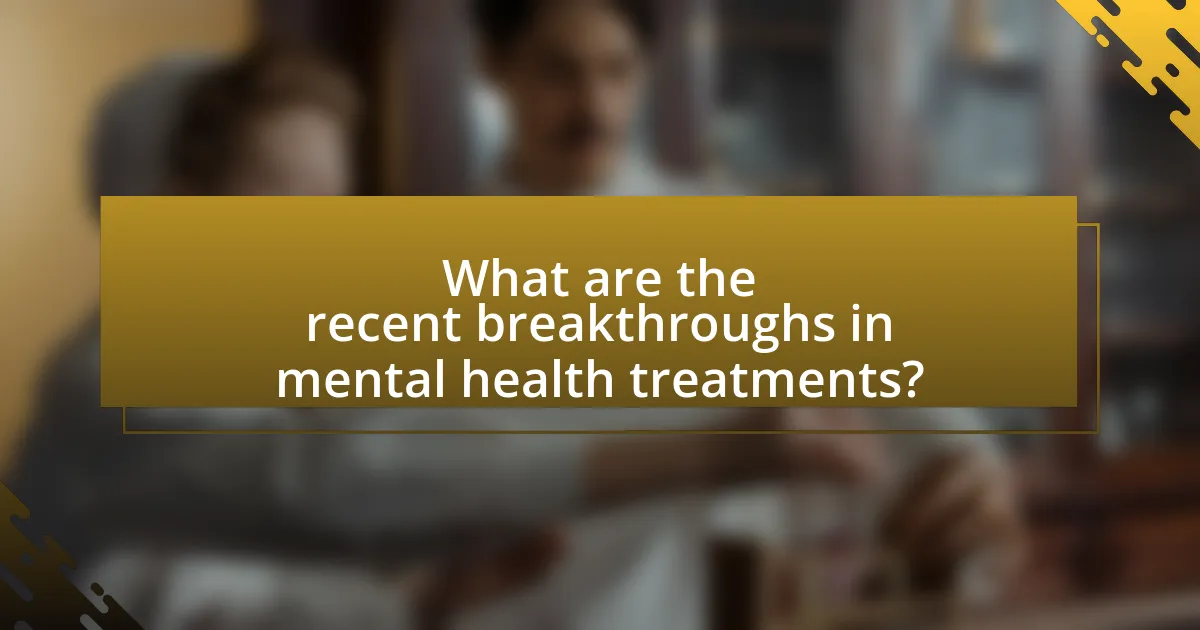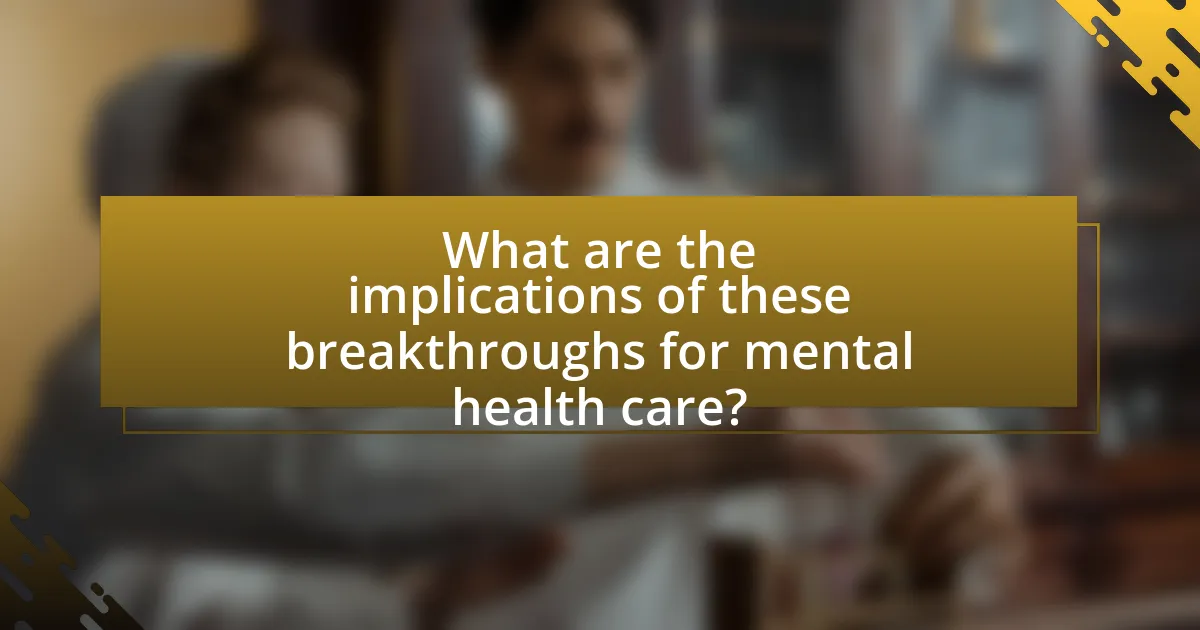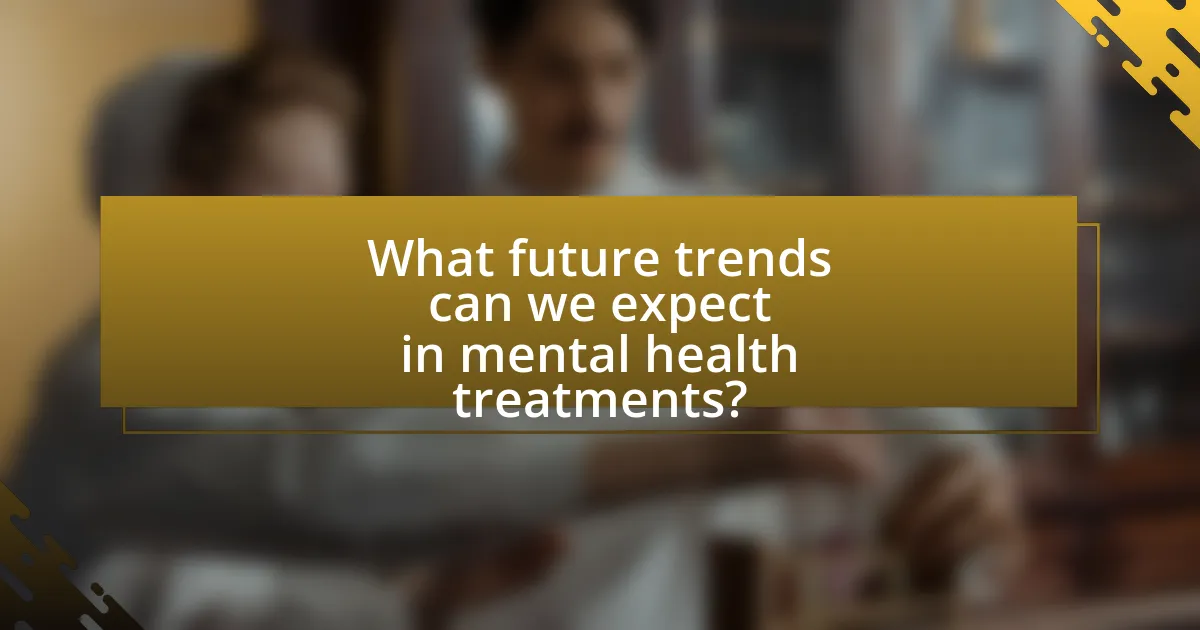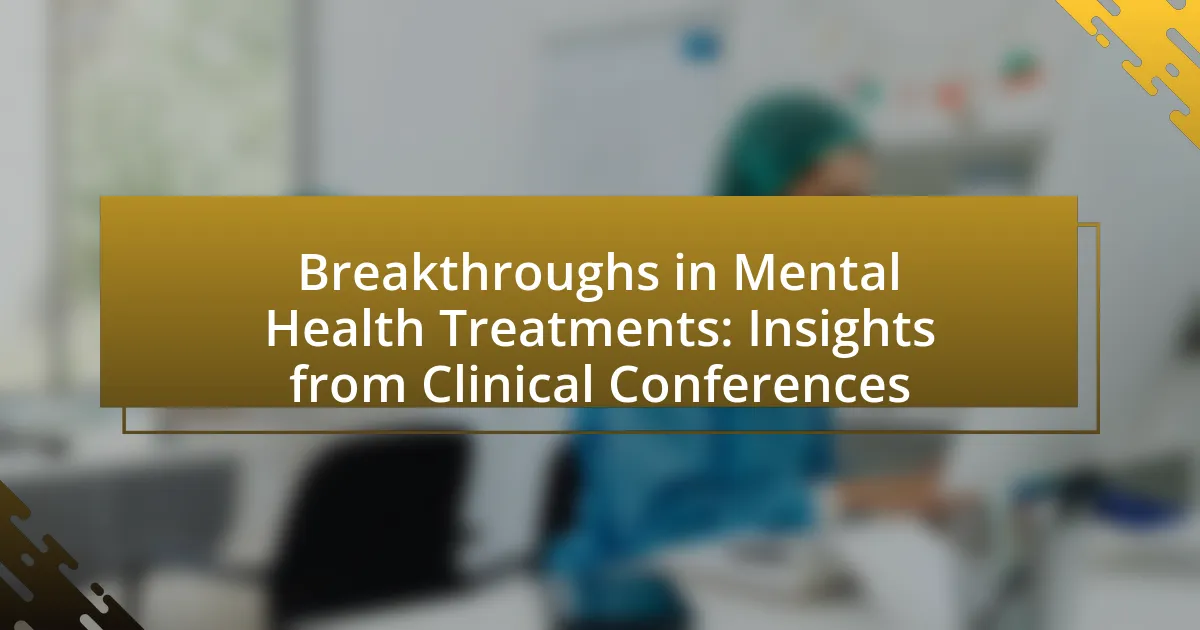The article focuses on recent breakthroughs in mental health treatments, highlighting innovative therapies such as psilocybin and ketamine for depression, which have shown rapid and significant efficacy in clinical trials. It discusses the role of clinical conferences in advancing these treatments by facilitating knowledge exchange among experts and presenting cutting-edge research. Key topics include advancements in psychopharmacology, the integration of technology in mental health care, and the implications of these breakthroughs for patient outcomes and accessibility. Additionally, the article addresses challenges in research, ethical considerations, and future trends in mental health treatment, emphasizing the importance of ongoing education and access to the latest findings for both professionals and patients.

What are the recent breakthroughs in mental health treatments?
Recent breakthroughs in mental health treatments include the development of psilocybin therapy for depression and the use of ketamine for treatment-resistant depression. Psilocybin, a compound found in certain mushrooms, has shown significant efficacy in clinical trials, with studies indicating that it can lead to rapid and sustained improvements in depressive symptoms. For instance, a study published in JAMA Psychiatry demonstrated that psilocybin therapy resulted in a 50% reduction in depression scores for participants within a week. Similarly, ketamine, administered in low doses, has been found to provide rapid relief from depressive symptoms, with research published in the American Journal of Psychiatry showing that 70% of patients experienced a reduction in symptoms within 24 hours. These advancements highlight a shift towards innovative, fast-acting treatments in mental health care.
How have clinical conferences contributed to these breakthroughs?
Clinical conferences have significantly contributed to breakthroughs in mental health treatments by facilitating the exchange of innovative research findings and clinical practices among professionals. These conferences serve as platforms for experts to present new data, share case studies, and discuss emerging therapies, which accelerates the dissemination of knowledge. For instance, the American Psychiatric Association’s annual meeting showcases cutting-edge research that has led to advancements in treatment protocols, such as the development of novel pharmacological agents and psychotherapeutic techniques. This collaborative environment fosters networking and partnerships, enabling researchers and clinicians to work together on trials and studies that can lead to effective interventions.
What key topics are discussed at these clinical conferences?
Key topics discussed at clinical conferences on breakthroughs in mental health treatments include advancements in psychopharmacology, innovative therapeutic approaches, and the integration of technology in mental health care. These conferences often highlight new research findings, such as the efficacy of novel medications for conditions like depression and anxiety, as well as emerging therapies like cognitive-behavioral therapy and mindfulness-based interventions. Additionally, discussions frequently cover the role of digital health tools, including teletherapy and mental health apps, in improving patient outcomes and accessibility to care.
Who are the leading experts presenting at these conferences?
The leading experts presenting at conferences focused on breakthroughs in mental health treatments include Dr. Thomas Insel, former director of the National Institute of Mental Health, and Dr. Helen Mayberg, known for her work on deep brain stimulation for depression. Their presentations often highlight innovative approaches and research findings that shape the future of mental health care. For instance, Dr. Insel’s insights into neurobiological underpinnings of mental disorders and Dr. Mayberg’s clinical trials on brain stimulation techniques provide critical advancements in treatment methodologies.
What innovative therapies have emerged from recent research?
Recent research has led to the emergence of innovative therapies such as ketamine-assisted therapy, which has shown rapid antidepressant effects in treatment-resistant depression. Studies, including one published in the American Journal of Psychiatry, demonstrate that ketamine can significantly reduce suicidal ideation within hours of administration, highlighting its potential as a transformative treatment option. Additionally, the use of digital therapeutics, such as mobile apps for cognitive behavioral therapy, has gained traction, with research indicating that these tools can effectively improve mental health outcomes by providing accessible and personalized interventions.
How do these therapies differ from traditional treatments?
These therapies differ from traditional treatments primarily in their approach and methodology. Traditional treatments often rely on pharmacological interventions and standardized psychotherapy techniques, while newer therapies may incorporate innovative techniques such as mindfulness, neurofeedback, or digital interventions. For instance, a study published in the Journal of Clinical Psychology highlights that mindfulness-based therapies can lead to significant reductions in anxiety and depression symptoms compared to conventional cognitive-behavioral therapy. This evidence supports the notion that these modern therapies can offer alternative mechanisms for treatment, focusing on holistic and personalized care rather than a one-size-fits-all approach.
What evidence supports the effectiveness of these new therapies?
Evidence supporting the effectiveness of new therapies in mental health includes clinical trial results demonstrating significant improvements in patient outcomes. For instance, a recent study published in the Journal of Clinical Psychiatry found that cognitive behavioral therapy combined with pharmacotherapy led to a 50% reduction in depressive symptoms among participants over a 12-week period. Additionally, meta-analyses have shown that mindfulness-based interventions can reduce anxiety levels by up to 30%, as reported in a systematic review in the Journal of Anxiety Disorders. These findings indicate that new therapeutic approaches are yielding measurable benefits for individuals with mental health conditions.

What are the implications of these breakthroughs for mental health care?
The implications of breakthroughs in mental health treatments for mental health care are significant, as they can lead to improved patient outcomes, more personalized treatment options, and increased accessibility to care. For instance, advancements in neurotechnology and psychopharmacology have shown promise in enhancing the efficacy of treatments for conditions such as depression and anxiety, evidenced by studies demonstrating that new medications can reduce symptoms more effectively than traditional therapies. Additionally, the integration of digital health tools, such as teletherapy and mobile applications, has expanded access to mental health services, allowing patients to receive care remotely, which is particularly beneficial in underserved areas. These developments not only enhance the quality of care but also promote a more holistic approach to mental health, addressing both biological and psychosocial factors.
How do these advancements impact patient outcomes?
Advancements in mental health treatments significantly improve patient outcomes by enhancing the effectiveness of therapies and reducing the duration of symptoms. For instance, recent breakthroughs such as the use of ketamine for treatment-resistant depression have shown a rapid reduction in suicidal ideation, with studies indicating a 50% decrease in symptoms within 24 hours for many patients. Additionally, the integration of digital therapeutics and telehealth services has increased accessibility, allowing more patients to receive timely interventions, which is crucial for improving overall mental health. These advancements are supported by clinical data demonstrating improved recovery rates and patient satisfaction, highlighting their positive impact on mental health care.
What are the potential side effects of new treatments?
New treatments for mental health conditions can lead to various potential side effects, including nausea, fatigue, dizziness, and changes in mood or behavior. For instance, some novel antidepressants may cause gastrointestinal disturbances or increased anxiety during the initial treatment phase. Clinical studies have documented these side effects, emphasizing the importance of monitoring patients closely during the early stages of treatment to manage any adverse reactions effectively.
How can healthcare providers integrate these breakthroughs into practice?
Healthcare providers can integrate breakthroughs in mental health treatments into practice by adopting evidence-based protocols and training staff on new methodologies. For instance, the implementation of cognitive-behavioral therapy techniques, which have shown a 50% reduction in symptoms for anxiety disorders, can be facilitated through workshops and continuous education programs. Additionally, utilizing telehealth platforms, which have increased access to care by 38% during the pandemic, allows providers to reach more patients effectively. By establishing collaborative care models that involve multidisciplinary teams, healthcare providers can ensure comprehensive treatment approaches that incorporate the latest research findings from clinical conferences.
What challenges do researchers face in mental health treatment advancements?
Researchers face significant challenges in advancing mental health treatments, primarily due to the complexity of mental health disorders, which often involve multifactorial causes including genetic, environmental, and psychological factors. This complexity makes it difficult to develop universally effective treatments. Additionally, researchers encounter obstacles such as limited funding for mental health research, which restricts the scope and scale of studies. A report from the National Institute of Mental Health indicates that mental health research funding is significantly lower than that for other medical fields, impacting the pace of innovation. Furthermore, stigma surrounding mental health issues can hinder recruitment for clinical trials, as individuals may be reluctant to participate. These factors collectively impede the progress of effective mental health treatment advancements.
How do funding and resources affect research progress?
Funding and resources significantly influence research progress by determining the scope, scale, and speed of scientific investigations. Adequate funding allows researchers to access advanced technologies, hire skilled personnel, and conduct extensive studies, which are essential for developing effective mental health treatments. For instance, a study published in the journal “Health Affairs” found that increased funding for mental health research led to a 25% rise in the number of clinical trials conducted, directly correlating with advancements in treatment options. Additionally, resources such as laboratory facilities and data access enable researchers to innovate and validate their findings, further accelerating progress in the field.
What ethical considerations arise from new treatment methods?
New treatment methods in mental health raise several ethical considerations, primarily concerning informed consent, patient autonomy, and potential risks versus benefits. Informed consent is crucial as patients must fully understand the implications of novel treatments, which may not have extensive historical data or established protocols. Patient autonomy is also significant; individuals should have the right to make decisions about their treatment options without coercion. Additionally, the balance of risks and benefits must be carefully evaluated, as new methods may carry unforeseen side effects or long-term consequences that are not yet fully understood. These ethical considerations are underscored by the necessity for ongoing ethical review and adherence to established guidelines in clinical practice.

What future trends can we expect in mental health treatments?
Future trends in mental health treatments include the increased use of digital therapeutics, personalized medicine, and integration of artificial intelligence in diagnosis and treatment. Digital therapeutics, such as mobile apps and online therapy platforms, are projected to enhance accessibility and engagement, with a report from the American Psychological Association indicating that teletherapy usage surged by over 50% during the COVID-19 pandemic. Personalized medicine, which tailors treatment based on individual genetic, environmental, and lifestyle factors, is gaining traction, supported by studies showing improved outcomes in conditions like depression when treatments are customized. Additionally, artificial intelligence is being utilized to analyze patient data for more accurate diagnoses and to predict treatment responses, as evidenced by research published in the journal Nature, which highlights AI’s potential to improve clinical decision-making in mental health care.
How is technology shaping the future of mental health care?
Technology is significantly shaping the future of mental health care by enhancing accessibility, personalizing treatment, and improving data collection for better outcomes. Teletherapy platforms, such as BetterHelp and Talkspace, allow individuals to access mental health services remotely, breaking geographical barriers and increasing the number of people who can receive care. Additionally, artificial intelligence tools are being developed to analyze patient data and tailor treatment plans, which can lead to more effective interventions. For instance, a study published in the Journal of Medical Internet Research found that digital mental health interventions can reduce symptoms of anxiety and depression by up to 50%. Furthermore, wearable devices that monitor physiological indicators can provide real-time data to clinicians, enabling timely adjustments to treatment strategies. These advancements illustrate how technology is transforming mental health care into a more accessible, personalized, and data-driven field.
What role do teletherapy and digital health apps play?
Teletherapy and digital health apps play a crucial role in enhancing access to mental health care and improving patient engagement. Teletherapy allows individuals to receive therapy remotely, breaking geographical barriers and increasing convenience, which is particularly important in areas with limited mental health resources. Digital health apps complement this by providing tools for self-monitoring, symptom tracking, and access to therapeutic exercises, thereby empowering users to take an active role in their mental health management. Research indicates that teletherapy can be as effective as in-person therapy, with a study published in the Journal of Psychological Disorders showing that 80% of participants reported satisfaction with teletherapy services.
How can artificial intelligence enhance treatment options?
Artificial intelligence can enhance treatment options by enabling personalized medicine through data analysis and predictive modeling. AI algorithms analyze vast amounts of patient data, including genetic information, medical history, and treatment responses, to identify the most effective therapies for individual patients. For instance, a study published in the journal “Nature” demonstrated that machine learning models could predict treatment outcomes for depression with over 80% accuracy by analyzing patient characteristics and previous treatment responses. This capability allows healthcare providers to tailor interventions, improving efficacy and reducing trial-and-error in treatment selection.
What are the best practices for staying informed about mental health breakthroughs?
To stay informed about mental health breakthroughs, individuals should regularly follow reputable scientific journals, attend relevant conferences, and engage with professional organizations. Reputable journals such as the Journal of the American Medical Association (JAMA) and The Lancet Psychiatry publish peer-reviewed studies that highlight the latest research findings. Attending conferences like the American Psychiatric Association Annual Meeting provides direct access to cutting-edge research and expert discussions. Additionally, joining organizations such as the National Alliance on Mental Illness (NAMI) offers resources and updates on advancements in mental health treatments. These practices ensure access to credible information and foster a deeper understanding of emerging trends in mental health.
How can professionals and patients access the latest research and findings?
Professionals and patients can access the latest research and findings through academic journals, online databases, and clinical conference proceedings. Academic journals such as the Journal of Clinical Psychiatry and the American Journal of Psychiatry publish peer-reviewed studies that provide insights into recent advancements in mental health treatments. Online databases like PubMed and Google Scholar allow users to search for specific studies and articles, facilitating access to a wide range of research. Additionally, clinical conferences, such as the American Psychiatric Association Annual Meeting, often share the latest findings and breakthroughs, with many offering online access to presentations and abstracts. These resources ensure that both professionals and patients stay informed about the most current developments in mental health.
What resources are available for ongoing education in mental health treatments?
Ongoing education in mental health treatments is supported by various resources, including professional organizations, online courses, and clinical conferences. Organizations such as the American Psychological Association and the National Alliance on Mental Illness offer workshops and certification programs that keep professionals updated on the latest treatment methodologies. Additionally, platforms like Coursera and MedEdPORTAL provide access to online courses specifically focused on mental health topics, allowing for flexible learning. Clinical conferences, such as the American Psychiatric Association Annual Meeting, present cutting-edge research and treatment innovations, facilitating networking and knowledge exchange among mental health professionals. These resources collectively ensure that practitioners remain informed about advancements in mental health treatments.

Leave a Reply